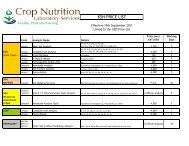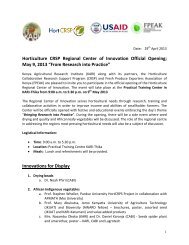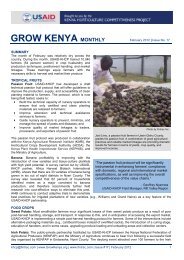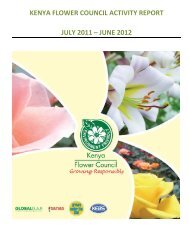FEB-MARCH 2013 ISSUE Final.ai - Hortinews.co.ke
FEB-MARCH 2013 ISSUE Final.ai - Hortinews.co.ke
FEB-MARCH 2013 ISSUE Final.ai - Hortinews.co.ke
You also want an ePaper? Increase the reach of your titles
YUMPU automatically turns print PDFs into web optimized ePapers that Google loves.
|| T H E K E N Y A B E A N ||<br />
Tough call for doctors<br />
Dr Alfred Serem, Managing<br />
Director, HCDA<br />
Dr. Ephr<strong>ai</strong>m Mukisira, KARI<br />
Director<br />
Dr Wilson Songa, Agriculture<br />
Secretary<br />
Dr James Onsando,<br />
Managing Director, KePHIS<br />
23<br />
ii) PCPB will register spray<br />
teams/units upon<br />
evidence of demonstrated<br />
capacity to adhere to<br />
standards.<br />
(work on pesticide quality is<br />
underway, and some<br />
initial results are already<br />
av<strong>ai</strong>lable at PCPB)<br />
C: MRL Monitoring:<br />
i) Fresh produce will be<br />
randomly sampled at farm<br />
level and at phytosanitary<br />
inspection end-point<br />
for pesticide maximum<br />
residue levels tests. This<br />
will be done in ac<strong>co</strong>rdance<br />
with a det<strong>ai</strong>led national<br />
MRL monitoring proto<strong>co</strong>l<br />
implemented by KePHIS<br />
and <strong>co</strong>ordinated at the<br />
horticulture CA level.<br />
ii) Farms and <strong>co</strong>mpanies<br />
having non-<strong>co</strong>mpliant<br />
products will be<br />
sanctioned with a view<br />
to ensuring effective<br />
<strong>co</strong>rrective action has been<br />
ta<strong>ke</strong>n. At the moment, this<br />
implies that if a sample is<br />
found to be having MRL<br />
excess either at KePHIS lab<br />
or EU level:<br />
a. Phytosanitary certification<br />
is withheld to stop further<br />
exports immediately;<br />
b. The <strong>co</strong>mpany clearly<br />
det<strong>ai</strong>ls in a report<br />
what went wrong, and<br />
<strong>co</strong>rrective actions ta<strong>ke</strong>n<br />
so far<br />
c. A team <strong>co</strong>mprising<br />
KePHIS, HCDA, PCPB and<br />
FPEAK visits the farm/<br />
scheme of farmers to<br />
verify the information and<br />
<strong>co</strong>mpliance status;<br />
d. Corrective actions are<br />
given to the farm;<br />
e. The team verifies<br />
implementation of<br />
<strong>co</strong>rrective actions;<br />
f. Issuance of phyto, hence<br />
export resumes.<br />
This whole process ta<strong>ke</strong>s<br />
a maximum 10 days,<br />
depending on how fast<br />
the <strong>co</strong>mpany implements<br />
<strong>co</strong>rrective actions.<br />
D) Increased emphasis on<br />
IPM:<br />
i) In addition to GAP on<br />
<strong>co</strong>nventional practices,<br />
the CA is advising farmers<br />
ag<strong>ai</strong>nst use of chemical<br />
pesticides post flowering,<br />
but rather to use biological<br />
and other integrated crop<br />
management measures<br />
ii)<br />
on pests. This is because<br />
<strong>co</strong>nsidering the routine<br />
harvesting of vegetables<br />
(d<strong>ai</strong>ly in case of green<br />
beans), it is unli<strong>ke</strong>ly that<br />
pre-harvest intervals for<br />
most pesticides will be<br />
practical post-flowering.<br />
There are several<br />
biological <strong>co</strong>ntrol agents<br />
registered in Kenya and<br />
the EU.<br />
KARI will carry out more<br />
trials on these novel<br />
biological agents and<br />
methods to provide<br />
farmers with more<br />
alternatives to pesticides.<br />
A national proto<strong>co</strong>l that<br />
det<strong>ai</strong>ls how periodically<br />
a fresh produce pest-list<br />
is updated, periodicity<br />
of efficacy trials on<br />
<strong>co</strong>nventional and<br />
biological pest <strong>co</strong>ntrol<br />
agents and systems of<br />
early warning will be<br />
developed by KARI and<br />
<strong>co</strong>ordinated centrally<br />
through the CA system.<br />
Kenya will notify the EU on:<br />
a) Proto<strong>co</strong>ls being implemented<br />
nationally to address the<br />
MRL issue; and<br />
b) Actual data being generated<br />
periodically as a result<br />
of implementation of<br />
the proto<strong>co</strong>ls. This will<br />
provide evidence that the<br />
systems being proposed<br />
are actually implemented<br />
and working.<br />
The idea is to minimise the<br />
necessity of lab checks as a<br />
means of checking if fresh<br />
produce is safe, but ensuring<br />
that there is a system at farm<br />
level that ensures farmers do<br />
the right things. This should<br />
be documented at farm level<br />
in a way that is traceable<br />
throughout the ch<strong>ai</strong>n. Such<br />
a system will give the EU the<br />
guarantees needed to stop<br />
10 per cent tests on Kenyan<br />
produce.<br />
We thank all exporters<br />
for <strong>co</strong>operating with these<br />
measures. We also thank<br />
our development partners,<br />
particularly TMEA and USAID<br />
through KHCP, for the assistance<br />
currently extended to help<br />
address this challenge.<br />
Dr Stephen Mbithi, is the<br />
Chief Executive Officer<br />
Fresh Produce Exporters<br />
Association of Kenya.<br />
24<br />
HORTICULTURAL NEWS I <strong>FEB</strong> / MAR <strong>2013</strong>












